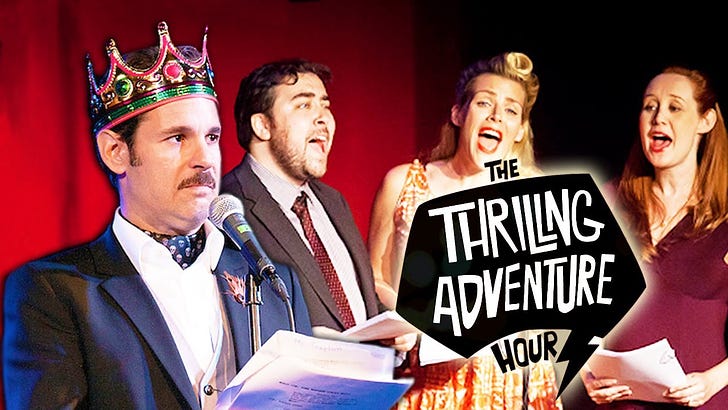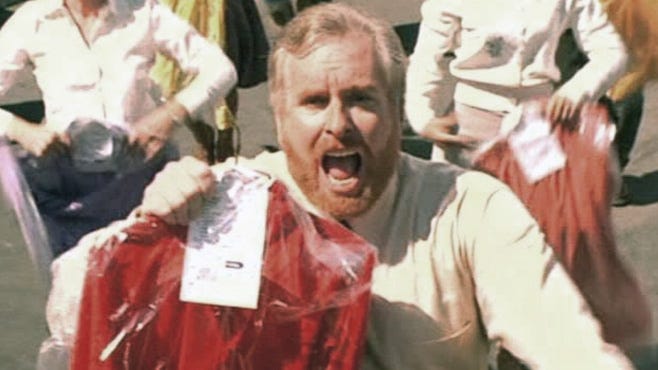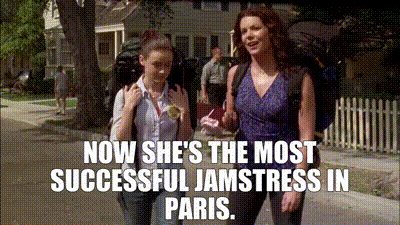One of the biggest pieces of advice that seasoned writers have imparted to new writers on The Writers Panel podcast is that you can’t just write your scripts and stick them in a drawer, waiting for something to happen.
You have to make your own stuff. Put material on its feet so you can hear how it sounds. See what actors bring to the characters and get that on the page in your rewrite.
Russian Doll co-creator Leslye Headland started out as a playwright. “The number one thing that I suggest to young playwrights is to get it up as soon as you can,” she says. It’s part of her process, and putting something on its feet will help you figure out what your piece is. In 2010, Headland wrote a play called Cinephilia about loving movies.
The tag line for it was “Loving movies is easy, loving people it hard.” Yikes.
We put it on in a warehouse. We didn’t even do it in a theater.
I’ll never forget the first time it was performed. I thought I had written this very intense, deep thing. I thought I was the voice of a generation and literally within the first two lines there was raucous laughter. I was mortified. I was just like, Oh my god they’re laughing at my beautiful play. And they laughed through the whole thing. It wasn’t until it was over and the actors were like, “That went great!” that I realized that I had unintentionally written a comedy. Apparently a very good one. But I did not mean to in any way. I thought I was writing something so much more deep than that.
Headland reworked Cinephilia, now as a comedy, and it helped bring her attention as a writer. Her debut film as writer/director, Bachelorette, based on one of her plays, premiered in 2012.
Bridget Carpenter (creator, 11/22/63) spent the entirety of her twenties as a playwright. “I was on my merry play-writing way,” she says, “and then I was like, I haven’t had health insurance for ages!” This wake-up call changed the direction of her career.
Dan Harmon and Rob Schrab “started Channel 101 because no one would hire us” after years of developing movies and writing the cult favorite dead TV pilot Heat Vision and Jack. Channel 101 was a brilliant creation, a film festival in which participants submit short TV pilots under five minutes in length, and the live audience would vote on which series they wanted to see continue. Channel 101 helped establish Harmon’s and Schrab’s voices and reputations.
“Then,” Harmon says, “eight years went by, and Sarah Silverman wanted to work with us because she saw a video where Rob fucked a lemon on the internet.”
The Sarah Silverman Program, co-created by Silverman, Harmon, and Schrab, ran for three seasons on Comedy Central.
Regular Show creator JG Quintel put up animated shorts on YouTube. Lots of folks, including Tami Sagher (Life and Beth), Girls co-creator Jenni Konner, and Key & Peele showrunners Ian Roberts and Jay Martel all performed improv for years, sharpening their storytelling and joke-telling. Mythic Quest co-creator Megan Ganz honed her skills at satirical newspaper The Onion. After The Onion writers were featured on an episode of This American Life, a television agent called Ganz to suggest she write for TV.
One of my favorite “making stuff” stories comes from David Fury, who was part of a New York sketch group who came to LA “with this material I’d written to showcase me as the next big sitcom star, and all everyone wanted to know was who wrote it. And I said, ‘Well, I did, but wasn’t I great in it? Wouldn’t you love to see me on TV’? And they said, ‘What else have you got? Do you have any screenplays, or teleplays or any kind of specs’?”
Fury’s acting career was quickly scuttled, and he became a television writer, going on to work on Buffy, Angel, 24, Fringe, Lost, and lots more shows. Though he did get in front of the camera in Buffy’s musical episode.
When we created The Thrilling Adventure Hour, my writing partner Ben Acker and I didn’t count on how much we would gain from it. Mostly, we wanted to write stuff and put it on its feet and to work with actors we loved. But we got so much more. Not just opportunities, though those did arise, but doing the show helped us to hone our craft. We wrote a new 80-page script every month for ten years. It helped get our name out there and gave us a place in the comedy and nerd communities. It taught us to be producers as well as writers, and sometimes directors too. It forced us to create new content fast and to work on a deadline.
It also became “the thing we do” for a decade. Which was both good and bad.
To repeat: we wrote and produced a new show, 80 pages, every month for a decade. We sold out our home theater, Largo at the Coronet, sometimes with double-shows. We got press on NPR and in Rolling Stone and The Hollywood Reporter. But the show still felt like something for people “in the know.” Acker and I would go to meetings with executives, and while they wouldn’t have heard of the show, their assistants loved it (same with Writers Panel tbh).
The Thrilling Adventure Hour was a cult phenomenon, something that felt timeless but was ahead of its time. Executives who make TV didn’t know what to do with it, but they were enthralled by the feeling of coming to the show (it really is something special live), they respected what we’d built, and they loved our writing and voice. But it didn’t translate in any clear way to television (though, ask us, we could tell you how it did), so while we got a lot of meetings out of Thrilling, few of them went anywhere.
Worse was this: when we were looking for new reps in 2017, we met a manager who told us our reputation plainly and honestly (a rarity): people think we’re too busy. We have our thing, The Thrilling Adventure Hour, and that’s the thing we do, and so we’re not available for staffing or selling or etc etc.
But- But what about the dozen pilots we’d sold in that time? The fifteen sample scripts? And what about the times we did staff? We’d been on a network show for a year and on an animated show for three (four?) and an FX show that never made it to… Oh. No one heard about those things because those weren’t the kinds of things to cut through the noise of social media.1
None of this was at the top of our resume because Thrilling was, because it was flashier and more of a “phenomenon” that showed who we were and what we could do.
Make a thing. But don’t make it the only thing.
So, we spent the next couple of years reframing our position in the industry. Lucky for us, this coincided with a general shift in television whereby a writer doesn’t just have to be one thing, write in one genre. (Thanks, Jordan Peele!). I’d been itching to write more genuine horror and more personal stories, and so we created new material that was in line with that. We didn’t abandon comedy—even our darkest horror scripts have some humor in them because, y’know, humans have humor in them—but none of the three new features and three new pilots we’ve written in the past few years are straightforwardly comic material. All of them, too, are much more personal and openly emotional.
And I think it’s worked. We are at the beginning stages of what began as an open writing assignment on a horror property with a studio exec who knew us only from a horror pilot we wrote. She mentioned, in our most recent meeting, that she wanted the same kind of human story against the genre backdrop that she’d read in that sample script.
The truth is, though, that I couldn’t have written these new scripts without the thousands of pages we churned out for The Thrilling Adventure Hour. That show consisted of genre-comedy segments where, because we are who we are, the stories were driven by character. Our new scripts are, in their bones, doing the same thing. We’re just not writing them for laughs.
I have a different outlook today about The Thrilling Adventure Hour than I did even just a few years ago. We’re bringing the show back for one night on December 17, and I’ve spent the last month breaking and writing and rewriting scripts for it with Acker and with a few other writers (we set ourselves up to showrun, which has been a blast). With so much less riding on the show, with our interests and attentions elsewhere for the other eleven months of the year, I’m excited for the show. I really love the scripts we’ve written, and I can’t wait to be backstage, watching from the wings as some of the most talented actors I know perform words that Acker and I wrote just to make ourselves laugh.
Join us on Saturday, December 17, at the Bourbon Room in Hollywood. We finished the scripts already, which is so much less stress-inducing than the last-minute completion we’d do back in the show’s heyday. And we’re getting to cast some fun, surprise guest stars in addition to our incredible regular cast: Paul F. Tompkins (Bojack Horseman), Paget Brewster (Criminal Minds), Marc Evan Jackson (The Good Place), Busy Philipps (Girls 5Eva), Joshua Malina (Scandal), Mark Gagliardi (Blood and Treasure), Craig Cackowski (Community), Autumn Reeser (The Wedding Veil), Annie Savage (Dicktown), Janet Varney (Legend of Korra) and Hal Lublin (The Venture Brothers).
The early show is already sold out, but there are still a few tickets to the 10pm show. I like the scripts better for the late show! (But then, I would, as I wrote those drafts). You can also live stream the show or watch it on demand. We wrote two hours of new material for this evening and I’m really proud of all of it. I hope you’ll check it out.
This Saturday at 10am is our Q&A with Jane Espenson! ICYMI the info is here. This is going to be a lot of fun as well as rewarding and informative. You can join the conversation, or listen to it later, only if you’re a paid subscriber, so stop messing around and upgrade now!
Our January Q&A guest is lined up too, and she’s a terrific writer of both television and film. You don’t want to miss these opportunities.
This is, of course, a mad simplification. We got a lot of opportunities, in TV and in comics and elsewhere, because of Thrilling, some of which panned out and some of which didn’t. There were also several reasons why Thrilling wasn’t positioned well or correctly in the industry. All of which I’ll talk about in future newsletters. Informational and cathartic!










Great post and great Q n A. It was like a lightning round masterclass--the perfect balance
Making my own stuff is the only reason I have a career. Loved this and am going to share it in my roundup Sunday!